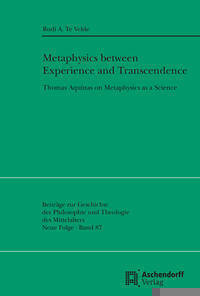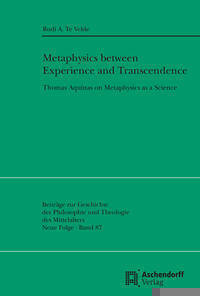
- Afhalen na 1 uur in een winkel met voorraad
- Gratis thuislevering in België vanaf € 30
- Ruim aanbod met 7 miljoen producten
- Afhalen na 1 uur in een winkel met voorraad
- Gratis thuislevering in België vanaf € 30
- Ruim aanbod met 7 miljoen producten
Zoeken
Metaphysics Between Experience and Transcendence
Rudi A Te Velde
Paperback | Engels | Beiträge zur Geschichte der Philosophie und Theologie des Mittelalters | nr. 88
€ 37,45
+ 74 punten
Omschrijving
Metaphysics, in its classical sense, is the study of being. But what does it mean, this seemly old-fashioned word, "being"? And how does metaphysics relate to the world of human experience if it is said to go beyond physics? Is "being" something hidden behind the veil of experience? Are we in danger, in attempting to defend the idea of metaphysics, to become Hinterweltler (Nietzsche)? These are relevant questions for anyone who wants to know, today, what we can still learn from the 'old' metaphysics from the Aristotelian tradition, of which Thomas Aquinas was one the most eloquent and insightful defenders. This book offers a philosophical analysis of metaphysics as conceived and practised by Thomas. Its aim is not to present another exposition of the doctrine of Thomistic metaphysics; its focus is on the characteristic movement of metaphysics, going from the world of experience to the divine principle of all being. By a close reading and interpretation of the relevant texts, it seeks to clarify the specific dynamics of the science of metaphysics, as present in the works of Aquinas. In the Aristotelian tradition, metaphysics exhibits a typical onto-theological orientation, as the study of being in general and the study of divine being. Going against a general tendency in the Thomistic tradition to loosen metaphysics as ontology from its theological part, this book presents a fresh and innovative reading which emphasizes the inner unity of metaphysics.
Specificaties
Betrokkenen
- Auteur(s):
- Uitgeverij:
Inhoud
- Aantal bladzijden:
- 246
- Taal:
- Engels
- Reeks:
- Reeksnummer:
- nr. 88
Eigenschappen
- Productcode (EAN):
- 9783402103074
- Verschijningsdatum:
- 29/03/2021
- Uitvoering:
- Paperback
- Formaat:
- Trade paperback (VS)
- Afmetingen:
- 156 mm x 19 mm
- Gewicht:
- 4486 g

Alleen bij Standaard Boekhandel
+ 74 punten op je klantenkaart van Standaard Boekhandel
Beoordelingen
We publiceren alleen reviews die voldoen aan de voorwaarden voor reviews. Bekijk onze voorwaarden voor reviews.











